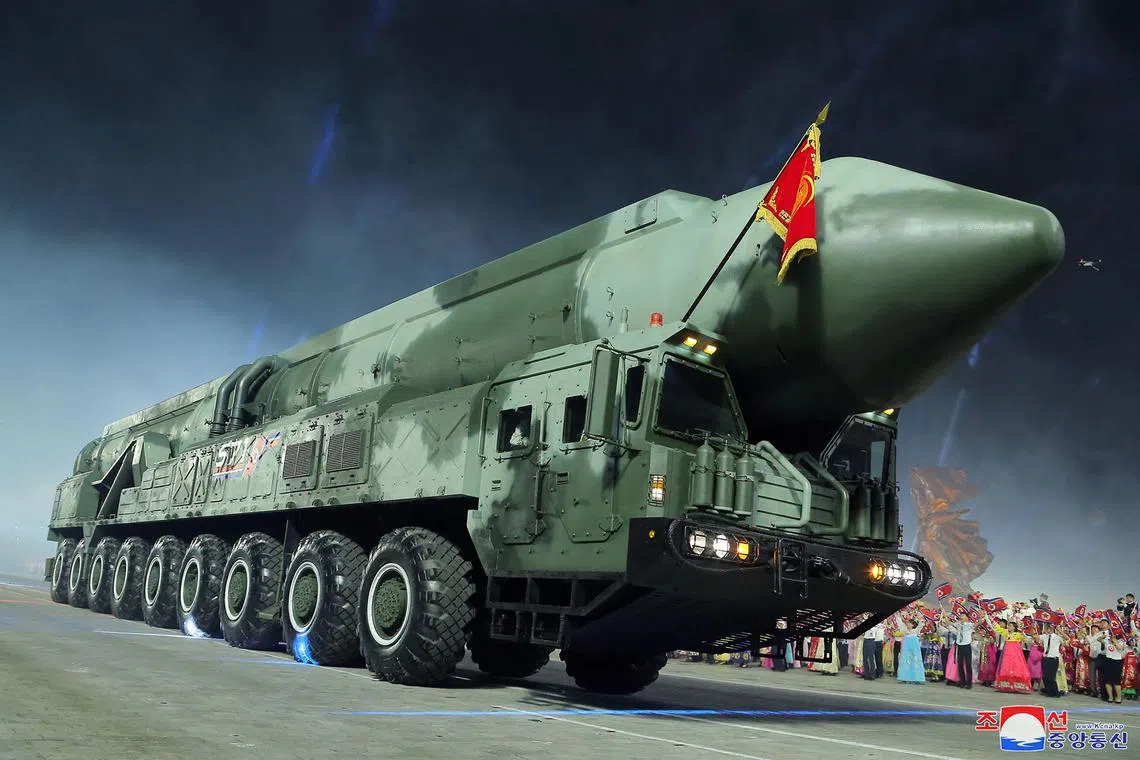South Korea leader Yoon seeks breakthrough in deterring Kim Jong Un and North’s missile threats
Sign up now: Get insights on Asia's fast-moving developments

A new model of intercontinental ballistic missile, the solid-fuel Hwasong-18, being paraded at Kim Il Sung Square in Pyongyang to mark a key anniversary of the Korean War.
PHOTO: AFP
SEOUL – South Korean President Yoon Suk-yeol said the world would never accept North Korea as a nuclear weapons power, while opening the door to a possible breakthrough in cooperation on deterrence with the US and Japan when leaders from the nations meet in a landmark summit later this week.
He expects that the summit with US President Joe Biden and Japanese Prime Minister Fumio Kishida will lead to agreement on ways to enhance their capabilities to respond to the nuclear and missile threats from North Korea,
Mr Yoon was mourning his father’s death on Tuesday at a Seoul hospital. Only a small funeral was held, where the South Korean leader received condolences from politicians including former president Lee Myung-bak.
“The complete denuclearisation of North Korea is a clear and consistent goal of the international community, including the Republic of Korea and the United States,” Mr Yoon said.
“The international community will never accept North Korea as a nuclear power under any circumstances.”
Three-way talks on what is known as extended deterrence – a force strong enough that it convinces an adversary it cannot achieve its military and political goals through aggression – would mark a new chapter in ties among the trio and help the Biden administration as it tries to manage threats posed by the likes of North Korea.
At a summit in April at the White House,
“Regarding extended deterrence, we are also open to separate consultations among the Republic of Korea, the United States and Japan,” Mr Yoon said, referring to his country by its formal name.
Japan and the US set up a regular bilateral dialogue for extended deterrence in 2010, Japan’s Foreign Ministry said.
The three sides held military talks in April and discussed items such as regular drills to track submarines and defend against missiles as ways to deter North Korea.
Dr Lim Eul-chul, a professor at Kyungnam University’s Institute for Far Eastern Studies in Seoul, said that by making talks on extended deterrence more formal, the process could be something like a mini-Nato aimed at keeping Beijing and Pyongyang in check.
China’s state-owned Global Times said the summit was targeting Beijing and adds to the drumbeat of “a new Cold War”.
Its Foreign Ministry said on Tuesday that China opposes the countries forming “small cliques” and is against actions that are confrontational.
While Mr Yoon’s government has welcomed the arrival of the USS Kentucky, the first ballistic missile submarine to arrive at a port in South Korea in about four decades, the Japanese public is far more apprehensive about such displays due to the country being attacked with nuclear bombs at the end of World War II.
North Korea has denounced the Nuclear Consultative Group, which met for the first time in July, as a “nuclear war tool”.
It demanded the end of submarine deployments and rejected requests from Washington and South Korea to return to long-stalled nuclear disarmament talks.
China has slammed bringing US submarines near the Korean peninsula, saying this undermines the global nuclear non-proliferation regime.
There will be discussions at the Camp David meeting
Within 2023, the three intend to operationalise their sharing of missile warning data on North Korea in real time as agreed upon at a summit last November.
North Korea leader Kim Jong Un has rolled out a new array of nuclear-capable missiles designed to deploy quickly and evade US-operated interceptors in the region.
The missiles could hit all of South Korea in a matter of minutes and most of Japan in less than 15 minutes from launch, underscoring the importance of real-time data sharing to prepare countermeasures.
The international community, including South Korea, the US and Japan, will strictly and thoroughly implement United Nations Security Council resolutions that impose sanctions on North Korea, Mr Yoon said.
Capabilities will be channelled into blocking Mr Kim’s illegal cyber activities that finance his development of weapons of mass destruction.
“We must make the North realise that its persistent and illegal nuclear and missile development will inevitably come at a cost and will only deepen its regime’s isolation and crises,” Mr Yoon added. Bloomberg


